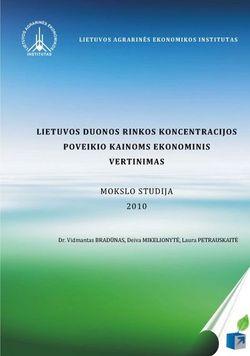
By performing the research study of the impact of the bread market concentration on prices the social and economic threats of market concentration were clarified, the Lithuanian bread market was defined, the trends of retail price structure and the reasons that caused these changes were analyzed, the level of the bread market concentration was estimated and the impact of this concentration on competitiveness and prices was assessed.
There are 4 big and 241 small and medium - sized bakeries operating in Lithuania. According to the Herfindahl - Hirschmann method, it was found that the Lithuanian bread market is not concentrated due to the large number of small and medium - sized bakeries and monopolistic competition should prevail in this market. However, the big bakeries, that occupy 30-50 per cent of the Lithuanian bread market, have a big influence to form supply and impose prices.
By using Correlation and Regression analysis it was found that the estimated correlation signal strength of changes in grain purchase and oil product sale prices and it‘s impact on changes in prices of grain products in 2006-2009 revealed that only about one - third of the price increase could be justified on objective grounds, while the other two thirds - on subjective desicions of producers and traders. These desicions are specific to the Lithuanian bread market, where the features of oligopolistic competitiveness are intensifying. Cartels and their consequences are possible in such a market.
According to the results of the research study, it was suggested that the legislative provisions that enable a predominant company position on the market, by occupying a smaller share of the market, could be specified.
